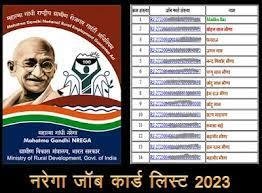The Mahatma Gandhi National Rural Employment Guarantee Act (MGNREGA) stands as a beacon of hope and empowerment for millions in rural India. At the heart of this transformative initiative lies the Nrega Job Card List, a vital document that serves as a gateway to employment opportunities, financial security, and social welfare for the rural populace.
What is the NREGA Job Card List?
The NREGA Job Card List is a comprehensive registry maintained by the government at the panchayat level. It includes details of households and individuals eligible to seek employment under the MGNREGA scheme. The job card acts as an identity and employment entitlement document for those enrolled, ensuring access to various benefits and work opportunities.
Significance and Objectives:
1. Access to Employment: The primary aim of the NREGA Job Card List is to provide rural households with a legal entitlement to 100 days of guaranteed wage employment in a financial year. This provision offers a safety net for those facing unemployment or underemployment in rural areas.
2. Transparency and Accountability: By maintaining a comprehensive list, the government ensures transparency in the allocation of work, wages, and funds. It minimizes corruption and ensures that eligible beneficiaries receive their entitled benefits.
3. Social Inclusion: The job card list promotes social inclusion by prioritizing the participation of marginalized sections of society, including women, Scheduled Castes (SCs), Scheduled Tribes (STs), and persons with disabilities (PWDs), fostering equitable opportunities.
Process of Enrollment:
Enrollment in the NREGA Job Card List involves specific steps:
1. Application: Eligible households apply for job cards at their local panchayat office, providing necessary details such as family composition, residential proof, and identification.
2. Verification and Issuance: After the application submission, authorities verify the information provided. Once verified, the job cards are issued to the eligible households.
3. Maintaining Records: The panchayat maintains records of issued job cards and regularly updates the job card list, incorporating new entrants and removing those no longer eligible.
Impact and Benefits:
The NREGA Job Card List has yielded several notable impacts and benefits:
1. Economic Empowerment: By guaranteeing employment, the scheme contributes significantly to poverty reduction by providing a livelihood to rural households, thereby enhancing their economic stability.
2. Infrastructure Development: The labor-intensive nature of the work undertaken under MGNREGA results in the creation and renovation of various rural assets like roads, water conservation structures, and irrigation facilities, contributing to infrastructure development.
3. Women's Empowerment: The scheme has played a pivotal role in enhancing women's participation in the workforce, empowering them financially and socially. It has also led to their increased decision-making roles within households.
4. Mitigating Distress Migration: By providing employment opportunities within rural areas, the scheme helps in curbing distress migration to urban centers in search of livelihoods.
Challenges and the Way Forward:
While the NREGA Job Card List has been instrumental in empowering rural communities, certain challenges persist:
1. Delayed Payments: Instances of delayed wage payments to workers have been reported, impacting the scheme's efficacy and discouraging participation.
2. Lack of Awareness: In some regions, lack of awareness about the scheme and its benefits leads to underutilization, hindering its potential impact.
3. Administrative Bottlenecks: Issues related to bureaucratic hurdles and administrative inefficiencies can impede the smooth implementation of the scheme.
To address these challenges and further strengthen the scheme:
1. Timely Payments: Ensuring prompt wage payments to workers is crucial for enhancing trust and participation. Streamlining payment processes and addressing delays is imperative.
2. Awareness Campaigns: Conducting extensive awareness campaigns to educate rural communities about the scheme's benefits, rights, and application procedures can encourage greater participation.
3. Capacity Building: Providing training and capacity-building programs for officials and stakeholders involved in the scheme's implementation can enhance efficiency and transparency.
Conclusion:
The NREGA Job Card List stands as a cornerstone of social welfare, promoting inclusive growth and livelihood security for rural households. While challenges persist, its impact in providing employment, empowering women, and fostering rural development cannot be understated. Strengthening its implementation, ensuring transparency, and addressing hurdles are key to unlocking its full potential and continuing to uplift the lives of millions in rural India.


https://sharesforecast.com/irfc-share-price-target/
https://rationcarddownload.org/